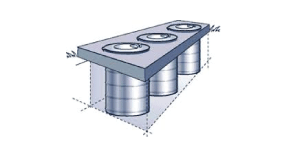News
How to install a new Camber Inground Trash Can in an existing Chief liner.
Posted by Don McWilliams on
Step One. If you have the tools and safety equipment you can install a can yourself. Otherwise have a local contractor do the work for you. Using an angle grinder, cut two 2" vertical slots in old liner inside of hinge brackets as shown.Now cut out the piece between the two slots. Step two. Slide your new Cambercan Liner into the old Chief Liner and align hinge holes as shown in the photo. Place two bolts or one long bolt thru the old hinge holes and the new liner hinge holes as shown. Add pea gravel to fill in...
Why Inground Cans?
Posted by AGD Supply on
CamberCans Underground Garbage Cans and Inground Trash Can Parts & Lids25 gal in-ground garbage cans One of the strongest underground garbage container systems available Sometimes it's just impossible to find a place to hide garbage. To solve this problem and to beautify property at the same time, install "Cambercans." Cambercans are underground garbage cans that eliminate ugly garbage, and decrease the clutter of ordinary surface garbage cans. The perfect hidden garbage can. Cambercans give you a lifetime of satisfaction because they are the most durable garbage container system available. Consider these benefits: Cambercans contain no plastic parts to break or...
Multi Unit Install for Trash and RECYCLING
Posted by AGD Supply on
How to install your new Inground Trash Can
Posted by AGD Supply on
Quick Installation Method Locate your Underground Receiver on the highest available ground where there is no abnormal water drainage, such as exists near a downspout. A place near the back door will give quick, easy access in all kinds of weather.Dig or auger a hole 6" to 8" deeper than the unit and at least 4" wider than the Shell diameter if the hole is dug. This makes it easier to tamp the earth around the Shell. Fill the extra depth with coarse gravel or stone to form a base for good drainage.Set the Receiver in the hole with the...


